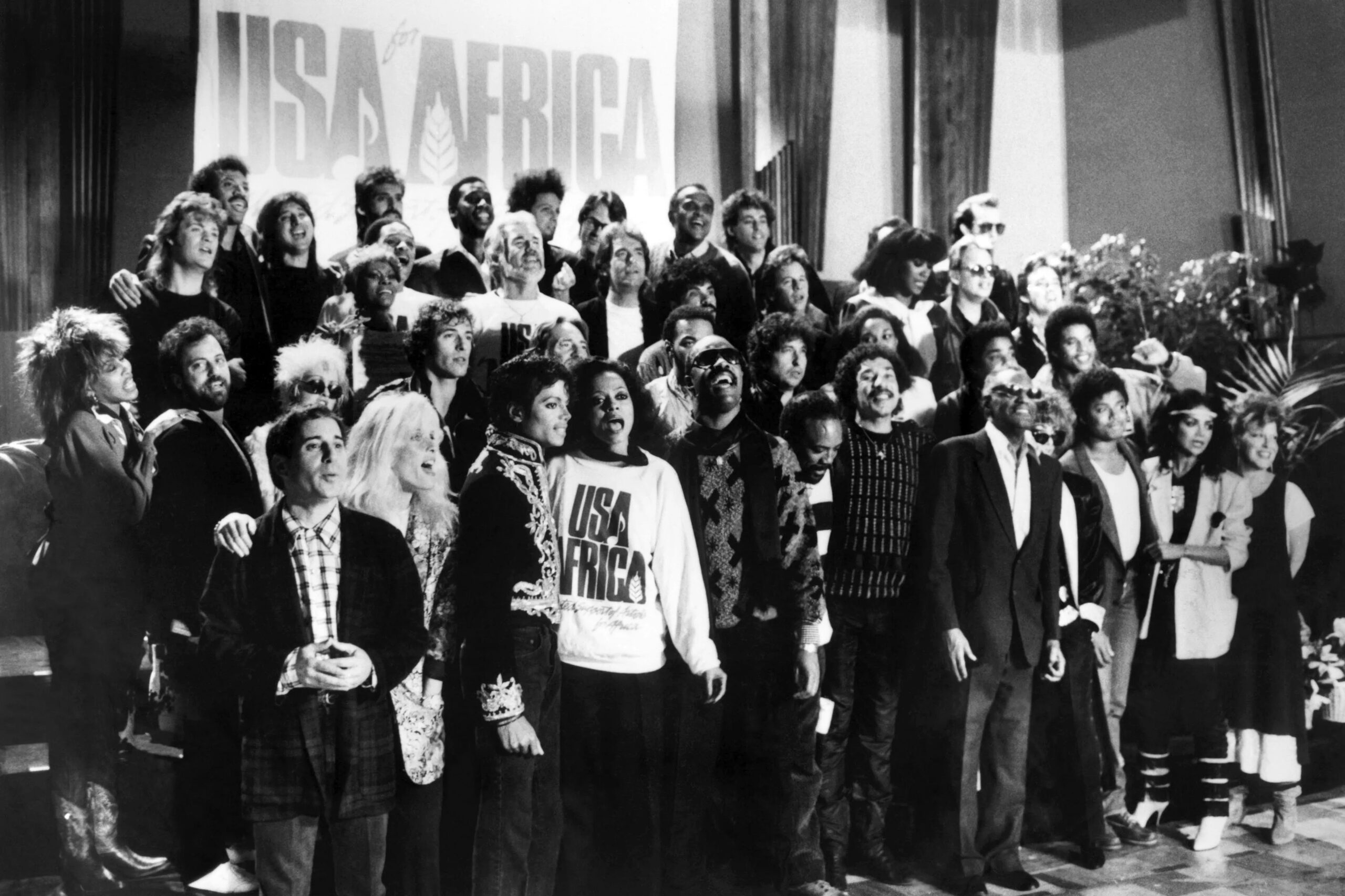Introduction
USA for Africa was the all-star one hit wonders famous for their charity single “We Are the World” during the mid-80s music era. Inspired by the similar charity music project Band Aid in the UK, the USA for Africa was formed with the intention of relieving famine in Africa. “We Are the World” became one of the fastest-selling singles in US music history and now an oldies music classic. More on USA for Africa here in this article.
Origins and formation
The idea of USA for Africa came from a project on the other side of the Atlantic — the British charity group Band Aid, which consisted of the biggest names in British music formed by Boomtown Rats’ Bob Geldof and producer Midge Ure. Band Aid’s 1984 single “Do They Know It’s Christmas?” became a worldwide success (it also went to the US Top 20) and that helped raise 8 million British pounds. Proceeds of the single went to the hunger reliefs in Ethiopia. Included of this all-star group were Bono, Boy George, Sting, Paul Weller and Jody Watley.
The Band Aid and the success of its song inspired the creation of USA for Africa, which also had the same good intentions — to help bring end famine in Africa, especially in Ethiopia.
It was singer Harry Belafonte who started it all. Having heard about Band Aid, he hatched up the idea of creating the Stateside version of Band Aid, which was to be called USA for Africa. “USA” means “United Support of Artists.”
Belafonte got in touch with showbiz manager and fundraiser Ken Kragen. In turn, Kragen contacted his clients Kenny Rogers and Lionel Richie and told him about the project, to which the two readily agreed. Richie also contacted Michael Jackson, who was at that time enjoying the record-breaking success of his album Thriller. Stevie Wonder also agreed to do the project, as did renowned producer Quincy Jones, who was asked to co-produce the song they were working on.
That song, entitled “We Are the World,” was written by Jackson and Richie in two hours.
Recording session, and release of “We Are the World.”
The original “USA for Africa” cast included the biggest names in US music at that time. Apart from Jackson, Belafonte, Rogers, Jones, Wonder and Richie, the group also included other big artists like Paul Simon, Billy Joel, Tina Turner, Diana Ross, Willie Nelson, Cyndi Lauper, Al Jarreau, Ray Charles, Bob Dylan, Bette Midler, Bruce Springsteen, and many others. Even Band Aid’s creator Bob Geldof joined (he is also known as an activist).
The 45-member supergroup gathered at the A&M Recording Studios on January 28, 1985 to record “We Are the World.”
Success of “We Are the World”
“We Are the World” was released as a single on Columbia Records on March 23, 1985. The single opened at #21 on the Billboard Hot 100. It climbed fast on the chart, until it went to #1 on April 13, staying there for two weeks.
The single eventually netted 7.5 million copies in the US alone, earning $50 million for famine relief in Ethiopia.
The song also won three Grammy Awards including “Song of the Year” and “Record of the Year. Its music video featuring the biggest and brightest American artists singing together as one, also became iconic.
The single’s accompanying album also featured nine other new music from other donating artists such as Prince, Chicago, Tina Turner and Bruce Springsteen and the E Street Band. It went to #1 on the Billboard 200 in 1985.
The format of both Band Aid and USA for Africa was to be duplicated several years later. Recordings and as well as benefit concerts like Live Aid (also established by Geldof) and Farm Aid which featured the big names in music very much followed the intentions of Band Aid and USA for Africa.
“We Are the World for Haiti”
A remake of “We Are the World,” entitled “We Are the World for Haiti” was released in 2010. It was executively produced by Quincy Jones and was recorded by the supergroup Artists for Haiti. The song was released to raise money for the relief efforts in Haiti, which was struck by a severe magnitude-7.0 earthquake that killed more than 160,000 people and displaced more than a million victims. Despite the remake being panned critically, it nevertheless became a world-wide hit.

